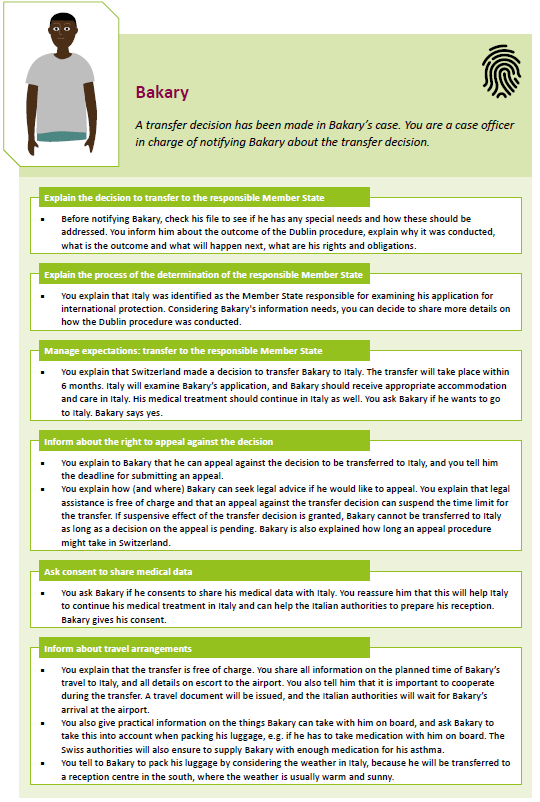The decision to transfer an applicant will be taken once a request to take charge or take back the person under the Dublin III regulation has been accepted by another Member State. This part examines information provision surrounding this step, and the notification of the decision to the person concerned.
A transfer decision can be seen by the applicant as either a positive or negative step depending on their personal situation. A person receiving a transfer decision that will allow them to reunite with family members will likely be happy and wish for a quick transfer.
Key information to provide when notifying the applicant about the transfer decision
The reasons for the transfer decision.
Make sure that the applicant understands why and based on which criteria another Member State has been determined to be responsible for examining their application, and that this process will start once they have been transferred to that Member State.
All Member States are bound by commonly agreed provisions of the CEAS.
Remind the applicant that all Member States are bound by the rules agreed at EU level or apply similar national rules with regards to the rights of the applicant on things such as accommodation and other basic needs, and also with regards to the obligations of the applicant.
Do they wish to appeal the transfer decision?
Discuss with the applicant whether they wish to appeal the transfer decision, to obtain some information on the possible continuation of the case. Inform the applicant about the legal remedies that are available to them, the time limits, including on the right to apply for suspensive effect, where applicable. If they do not appeal the decision, it becomes enforceable on the expiration of the time limits relating to the appeal.
Explain what legal assistance is available and how the applicant can access it.
Remind the applicant of their right to receive legal assistance, the contact details of persons or entities that may provide such legal assistance and the practical steps necessary to receive such support.
Inform about time limits and practical elements of the transfer.
Inform the applicant about the time limits to carry out the transfer, and, if possible, provide a time frame of any upcoming meetings. Underline the importance to cooperate with the authorities and the potential consequences of not doing so.
Good practice: informing the applicant early on about the consent required to transfer medical information
Sometimes an applicant that is undergoing medical treatment will be worried about whether they will be allowed to continue their treatment after a transfer to another Member State. Informing the applicant early on about the consent required to transfer medical information to the receiving Member State and that this provision is there to help the applicant to receive continued medical care in the receiving Member State can help to reassure the applicant.
Character: Bakary

Character: Mahmoud
